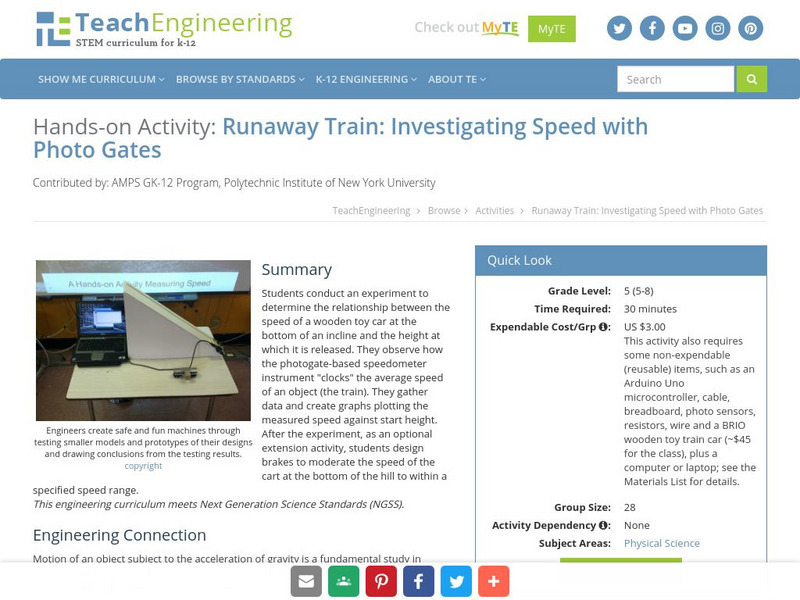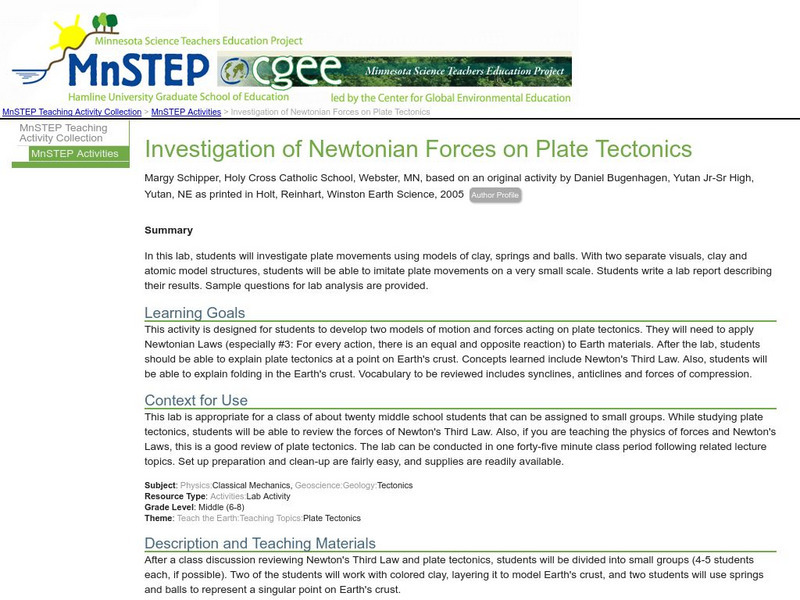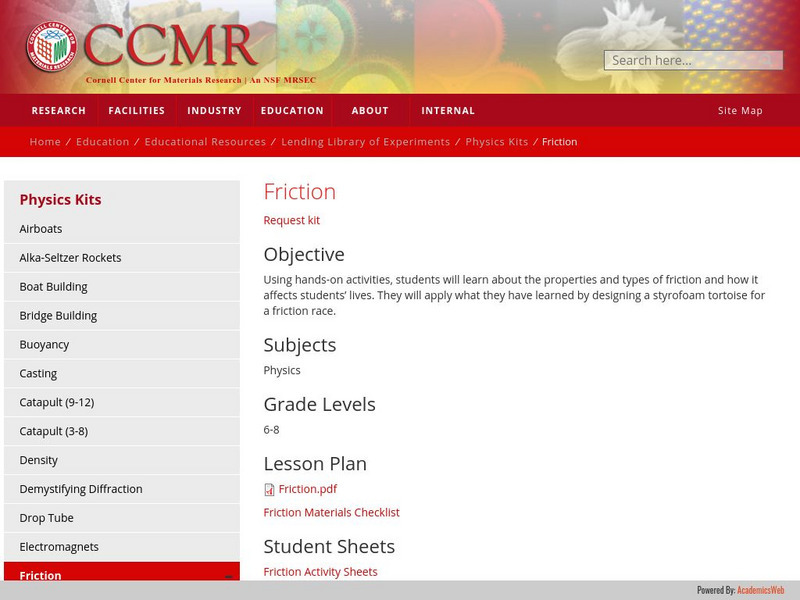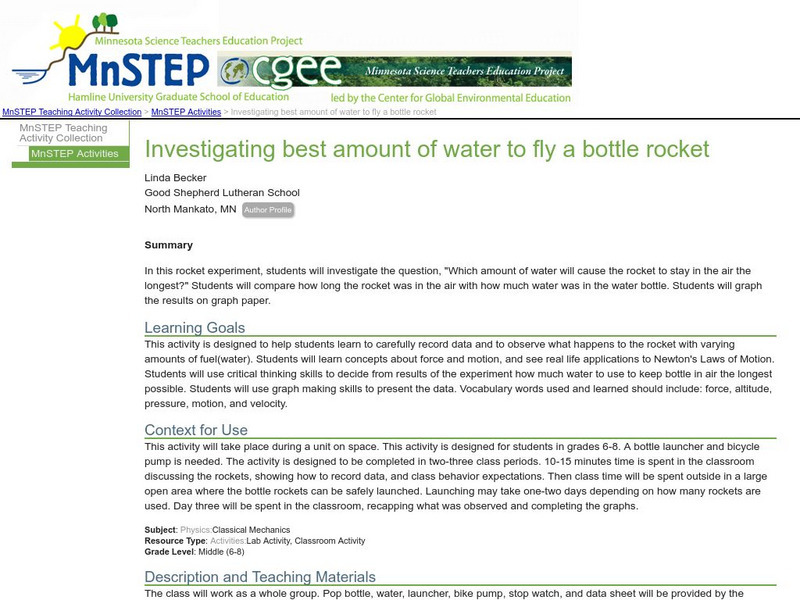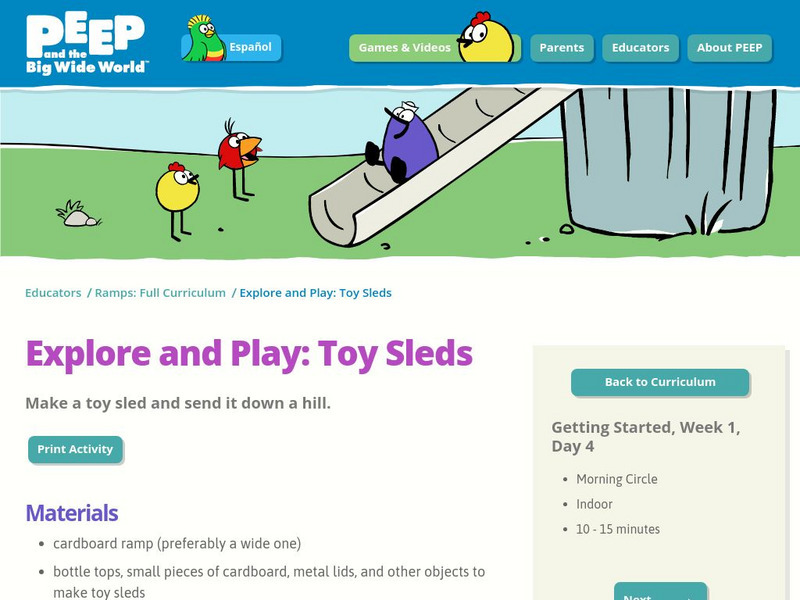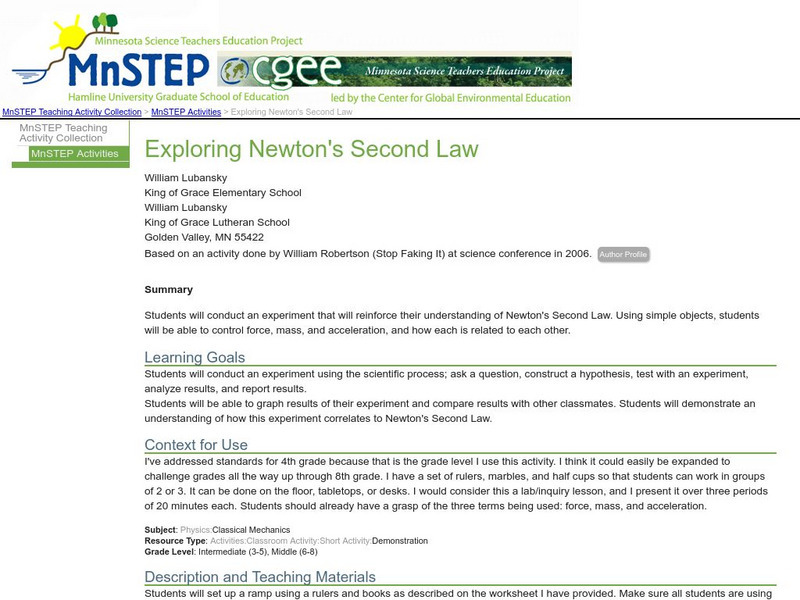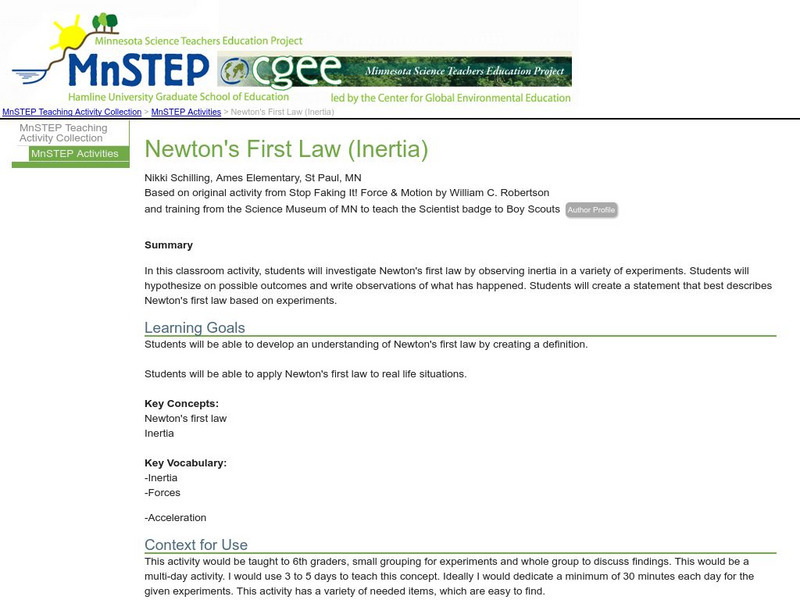CK-12 Foundation
Ck 12 Exploration Series: Simulations: Physics: Irwin and Ruthie
[Free Registration/Login Required] Learn about the relationship between position, velocity, and acceleration for two objects in one-dimensional motion. Experiment with varying approaches to the race for both Irwin and Ruthie to see how...
Khan Academy
Khan Academy: Activity: Frictional Force Experiment
A lesson about friction can be found on this website. Students will experiment to see how motion and frictional force affect the game of football.
CK-12 Foundation
Ck 12 Exploration Series: Simulations: Physics: Portrait Gallery
[Free Registration/Login Required] Learn about adding force vectors in two dimensions using the example of a painting hanging from two strings. Experiment with variables of weight and angles to hang a portrait in this physics simulation....
TeachEngineering
Teach Engineering: Runaway Train: Investigating Speed With Photo Gates
Students conduct an experiment to determine the relationship between the speed of a wooden toy car at the bottom of an incline and the height at which it is released. They observe how the photogate-based speedometer instrument "clocks"...
CK-12 Foundation
Ck 12 Exploration Series: Simulations: Physics: Butterfly Stroke
[Free Registration/Login Required] Learn about the relationship between velocity and position for a swimmer. Adjust the velocity of the legs, streamline, and arms to experiment with the slope of velocity in the simulation swimmer. Dig a...
CK-12 Foundation
Ck 12 Exploration Series: Simulations: Physics: Model Rocket
[Free Registration/Login Required] Learn about the relationship between position and velocity for a model rocket during launch and in free-fall. Experiment with rocket mass, rocket thrust, and rocket burn time to understand the...
Science Education Resource Center at Carleton College
Serc: Inertia: An Object in Motion Will Tend to Stay in Motion
This activity is a take off of Galileo's experiment with the inclined planes to show that an object in motion would stay in a straight line motion if no outside forces acted were acting on it. In this version, students will roll a ball...
Science Education Resource Center at Carleton College
Serc: Investigation of Newtonian Forces on Plate Tectonics
An investigation for students to understand plate tectonics by using models to see how motion and forces act on the plates. Students can use these models to see the connection between Newtonian Laws to Earth materials. Lesson plan...
PBS
Pbs Kids: Activities and Videos: Force/energy
Videos that accompany activities that are hands-on challenges that focus on the engineering design process. They use simple materials, allow for multiple solutions, and are ideal for ages 9-12.
Cornell University
Cornell University: Cornell Center for Materials Research: Friction
A collection of experiments where students can learn about how friction works and affects the physical world. At the end, students design a tortoise to win by slowing it down using friction. Lesson includes explanation of the concept of...
Science Education Resource Center at Carleton College
Serc: Investigating Best Amount of Water to Fly a Bottle Rocket
In this rocket experiment, students will investigate the question, "Which amount of water will cause the rocket to stay in the air the longest?" Students will compare how long the rocket was in the air with how much water was in the...
Physics Classroom
The Physics Classroom: Newtons Laws: Rocket Sledder Interactive
Experience the effect of friction, air resistance, and applied force upon a sledder. The speed, acceleration, and force values are displayed as the sled moves. Learners can vary the mass of the sledder and the size of the parachute...
Hunkins Experiments
Hunkin's Experiments: Balance
Hunkin's Experiments is a group of simple cartoon illustrations of scientific principles. Some would work well in the classroom, but others have little value beyond entertaining students. All of the projects are easy to do. This pair of...
Concord Consortium
Concord Consortium: Stem Resources: Building a Bungee Jump
Students are asked to create a bungee jump that will protect a hard-boiled egg from breaking. A force sensor is needed to measure the push/pull forces on the egg. Data is inserted into force-time graphs. After completing three...
TeachEngineering
Teach Engineering: Sliding Textbooks
In this culminating activity of the unit which highlights how forces play a role in engineering design and material choices, students explore and apply their knowledge of forces, friction, acceleration, and gravity in a two-part experiment.
TeachEngineering
Teach Engineering: The Force of Friction
In the first of two lessons of this curricular unit, students are introduced to the concept of friction as a force that impedes motion when two surfaces are in contact. Student teams use spring scales to drag objects, such as a ceramic...
PBS
Wgbh: Peep and the Big Wide World: Explore and Play: Toy Sleds
Students experiment with different materials and objects to make a sled that will slide down the ramps.
Physics Classroom
The Physics Classroom: Circular, Satellite, Rotational: Inertia Right Hand Turn
Many students of physics do not believe in centripetal/inward forces. Even after completion of a thorough physics course, such students will still incorrectly believe that an object moving in a circle experiences an outward force. Use...
Science Education Resource Center at Carleton College
Serc: Exploring Newton's Second Law
Students conduct an experiment that will reinforce their understanding of Newton's Second Law. Using simple objects, students control force, mass, and acceleration, and how each is related to each other.
Science Education Resource Center at Carleton College
Serc: Newton's First Law (Inertia)
This activity provides students an opportunity to investigate Newton's first law by observing inertia in a variety of experiments. Students will hypothesize on possible outcomes, write observations of what has happened, and apply...
TeachEngineering
Teach Engineering: Mechanics Mania
Through ten lessons and numerous activities, students explore the natural universal rules engineers and physicists use to understand how things move and stay still. Together, these rules are called "mechanics." The study of mechanics is...
TeachEngineering
Teach Engineering: Flocculants: The First Step to Cleaner Water!
Students experience firsthand one of the most common water treatment types in the industry today, flocculants. They learn how the amount of suspended solids in water is measured using the basic properties of matter and light. In...
PBS
Pbs Teachers: Soda Bottle Boat Experiment
Use the chemical reaction that occurs when mixing a base (baking soda) with an acid (vinegar) to turn a plastic soda bottle into a jet boat.
Concord Consortium
The Concord Consortium: Molecular Workbench: Rolling Down an Inclined Plane
Experiment with gravity as a variable to observe the effects of gravity on an object rolling down an inclined surface.


